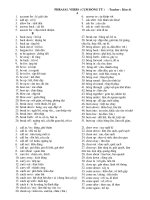MASTERING YOUR PHRASAL VERBS 17
Bạn đang xem bản rút gọn của tài liệu. Xem và tải ngay bản đầy đủ của tài liệu tại đây (292.33 KB, 2 trang )
WORK ON YOUR PHRASAL VERBS 17 ~ MOVEMENT & CHANGE
1. bring up. If you bring up a child, you look after it until it is grown up and you try to give
it particular beliefs.
- His parents brought him up to believe it was possible to achieve anything.
2. come along. [a] When someone comes along or comes along a road or other area of
ground, they move along somewhere towards you.
- They're coming along behind us, I think.
[b] When something or someone comes along, they start to happen or exist.
- This was the greatest advance until X-rays came along in the 1890s.
[c] If something or someone is coming along, they are making progress or developing in the
way you want.
- The arrangements are coming along nicely.
NOTE. You can also use come on.
3. come back. When someone or something comes back, they return to the place where they
were before.
- Dad's just come back from the barber's.
4. come down. When someone or something comes down or comes down something, they
move from a higher position to a lower one.
- We met them as they were coming down the hill.
5. come in. When someone comes in, they enter the room or building where you are.
- She came in and sat on the edge of the bed.
6. come off. If someone or something comes off or comes off an area, place, or vehicle, they
leave it.
- Their goalkeeper had to come off with an injury.
- She saw him come off the plane.
7. come out. When someone comes out of their house or room, or a place where they were
hidden, they leave it or appear from it.
- I saw them go into the building and come out five minutes later.
8. come through. When someone comes through, they move out of one room and enter
another.
- The doctor can see you now if you would like to come through.
9. come up. When someone or something comes up or comes up something, they move
from a lower position to a higher one, or move towards the place where you are.
- I could hear him coming up the stairs.
10. get back. [a] If you get back, you return somewhere after being in another place.
- What time do you usually get back from work?
[b] If you get something back, you get it again after losing it or giving it to someone else.
- I'm going to return it to the shop and get my money back.
11. go over. When you go over, you move towards someone or something and reach them.
- I went over to congratulate the parents on their son’s admission to the college.
12. grow up. [a] When a child grows up, they gradually change into being an adult.
- I was born in Hue but grew up in HCM City.
[b] If you tell an adult to grow up, you are telling them in an angry way to stop behaving in
a silly or childish way. [INFORMAL]
- You're upset because she’s giving the baby more attention than you? Grow up, Giang!
th
Thẩm Tâm Vy, October 12 , 2018
WORK ON YOUR PHRASAL VERBS 17
13. leave behind. If you leave someone or something behind, you do not take them with
you when you go somewhere.
- The LCD TV wouldn't fit in the car, so we had to leave it behind.
14. make for. If you make for a place, you move towards it in a quick or determined way.
- The best thing would be to make for high ground.
NOTE. You can also use head for.
15. move in. When you move in, you begin to live in a house or place.
- I've got the keys and I'm moving in on Saturday.
NOTE. The opposite of move in is move out.
16. return to. When you return to a place, you go back there after you have been away.
- I returned to my home town three weeks ago.
17. run down. To run down somewhere means to run to a lower level or away from a place.
- She ran down the steps as she heard a familiar voice.
18. start out. [a] If you start out, you begin to move and go somewhere.
- They started out early the next morning.
NOTE. You can also use set off, set out, and start off.
[b] To start out means to begin something in a particular way or by doing a particular thing.
- He started out in his early twenties with a small shop.
NOTE. You can also use start off.
NOTE. The opposite of start out is end up.
PRACTICE
I. Complete the sentences. Choose the correct particles.
1. Anh Dao was brought off / up / for by strict parents.
2. After driving for a while, we came out / in / through of the tunnel.
3. Lam left the room and came along / behind / back with his laptop.
4. This kind of opportunity doesn't often come down / along / over.
5. When did you get over / on / back from your holiday?
6. Khanh grew up / out / away in a small town outside Hanoi.
II. Match sentence halves 1-6 with A-F to make complete sentences.
1. I'm determined to get
A. and said hello.
2. He went over to her
B. down the stairs.
3. When we moved in, the house
C. my money back.
4. When the game finished, we started
D. out for home.
5. She found an umbrella in the station
E. that someone had left behind.
6. He ran
F. had no furniture.
III. Decide if the following sentences are true (T) or false (F).
1. If you come in, you enter a place.
2. If you come off, you leave a place.
3. If you come out of a place, you enter it.
4. If you come through, you leave one room and enter another.
5. If you come up, you move from a high position to a lower one.
6. If you come down, you move from a low position to a higher one.
IV. Complete the sentences with the phrasal verbs in the box.
coming off - came in - returned to - come through - coming up - made for
MOVEMENT & CHANGE
1. Why don't you..................to the living room to watch TV?
2. When he....................he looked tired.
3. We watched the passengers..................the boat.
4. She could see a large tractor...................the hill.
5. After the film finished, we................the exit.
6. Yen Vy..................the library a week later.
V. Complete the sentences with the correct form of the phrasal verbs in the box.
come along - start out - get...back - go over - come back
1. Maria has just.................... from a holiday in Vietnam.
2. His phone made a beeping noise, so he.................... and picked it up.
3. How is your research programme.................... ?
4. I .................... as a technician, but now I'm a manager.
5. She lent him a pen, but she didn't.......... it...........
VI. Correct the phrasal verbs in these sentences.
1. Where were you grown up?
2. It took the passengers a long time to come out the plane.
3. The explorer started up on a journey to Asia.
4. After many years, he ended out having travelled around the world.
5. If it starts raining, go for the forest - we can shelter there.
6. The holidays are over and it's time to return back college.
VII. Match the underlined phrasal verbs 1 -6 with a word or phrase A-F with the same
meaning.
1. If you get lost, just go up to a local person and ask for directions.
2. What time do you usually get back from work?
3. He was seriously injured in a bicycle accident, but he's coming along nicely.
4. If you aren't happy with the product, you can get your money back.
5. We're going to live in a different town. We're moving out at the end of the month.
6. Can you believe it - the day before my holiday, and I'm coming down with a terrible
cold.
A. get something back again after giving it to someone
B. making good progress
C. starting to get
D. return
E. approach
F. leaving this place
VIII. Read this extract from Reza's blog, where he talks about how his life has
changed. Underline all the phrasal verbs, then answer the questions.
I grew up in a small village. When I was still young, my father didn't come back from the
war, so my mother had to bring me up on her own. When I was older, I had to leave my
mother behind to look for work in the city. But I knew I could return to the village to visit my
family and friends. When I started out living in the city, I had no money. But now I have my
own small software company, and the business is really coming along. In fact I've just
bought a new house and I can't wait to move in!
1. Where did Reza grow up?
2. Who didn't come back from the war?
th
Thẩm Tâm Vy, October 12 , 2018
WORK ON YOUR PHRASAL VERBS 17
3. Who brought Reza up?
4. Why did Reza have to leave his mother behind?
5. Is Reza's business successful?
6. Is Reza living in the house he has just bought?
ANSWER KEY
I. 1. up 2. out 3. back 4. along 5. back 6. up
II. 1. C 2. A 3. F 4. D 5. E 6. B
III. 1. T 2. T 3. F 4. T 5. F 6. F
IV. 1. come through 2. came in 3. coming off 4. coming up 5. made for 6. returned to
V. 1. come back 2. went over 3. coming along 4. started out 5. get (it) back
VI. 1. brought up 2. come off 3. started out 4. ended up 5. make for 6. return to
VII. 1. E 2. D 3. B 4. A 5. F 6. C
VIII. I grew up in a small village. When I was still young, my father didn't come back from
the war, so my mother had to bring me up on her own. When I was older, I had to leave my
mother behind to look for work in the city. But I knew I could return to the village to visit
my family and friends. When I started out living in the city, I had no money. But now I
have my own small software company, and the business is really coming along. In fact I've
just bought a new house and I can't wait to move in!
1. Reza grew up in a small village.
2. His father didn't come back from the war.
3. His mother brought Reza up.
4. Reza had to leave his mother behind to look for work in the city.
5. Yes, it is.
6. No, he isn't.
MOVEMENT & CHANGE









